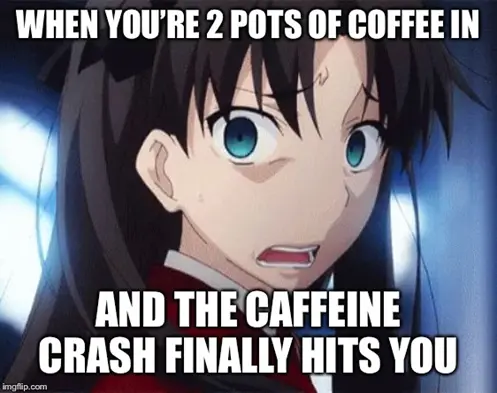Coffee can pick you up, and it can also bring you down pretty easily. But, of course, We are talking about a caffeine crash, will tell you tips to avoid caffeine crash. Because trust us, even most coffee professionals don’t want to deal with it.

But how do you get past something associated with drinking coffee, which is a daily habit? To help out our fellow coffeenomies, today we’ll be talking all about a caffeine crash, the reason, the symptoms, and ways to get around it.
So grab a cup of coffee, and let’s get to it.
What Is A Caffeine Crash?
Remember all the sleepless nights where you are just staring at your phone, scrolling through social media, and scoffing at random memes because you can’t concentrate on work?
That’s how a regular caffeine crash usually looks like if you consume a considerably high dose of caffeine early in the day.
Caffeine crashes occur when you keep caffeinating yourself when you’re tired, but you keep stimulating your brain instead of resting.
Reasons Behind A Caffeine Crash
Buckle your seatbelts because it’s time for some science facts about why caffeine crashes take place.

Reason #1: Your Liver
Different people react differently to caffeine; that’s why when your friend says he can chug down multiple cups of coffee and fall asleep by 10, he might not be bluffing.
To understand why your body goes through a caffeine crash, you need to understand how your metabolism handles caffeine.
As soon as it enters your body, caffeine hits your central nervous system, fires it all up, and makes you hyper-alert about everything. It’s almost like you can hear colors and see sounds from all the pumping adrenaline that increases your blood pressure and heart rate. But for many, this is a temporary change.
But why do some people feel ill after coffee consumption and have several weird symptoms? It’s because of the liver enzyme named CYP1A2 in your body that breaks down the caffeine. And the secret of the effect lies behind the gene code of the enzyme.
Scientists have divided people into three groups depending on the metabolism rate of their liver:
- High metabolizers
- Regular metabolizers
- Low metabolizers
As you can already tell, the faster your metabolism is, the better it clears the caffeine out of your system. But, on the other hand, the caffeine stays in the system longer, and you can feel the effects with a slow metabolism.
Reason #2: Your Brain
The part that controls every function in your body also affects a function called metabolism.

When you skip your beauty sleep frequently, your brain starts producing adenosine at higher levels. Adenosine makes you sleepy by slowing down your brain activity. On the other hand, caffeine keeps you awake by blocking the adenosine that attaches to receptors in your brain.
When you have too much caffeine and stay awake for a long time, the moment the caffeine wears off, the adenosine that’s been waiting for all this time overloads your brain and constantly tells you it’s nap time, even when it’s barely evening.
When the brain is flooded with adenosine, you will constantly feel sleepy and dizzy. This is an exact replica of the caffeine crash effect.
Symptoms Of A Caffeine Crash
There are several symptoms of a caffeine crash, and many of them are similar to caffeine withdrawal symptoms. The most common ones are:
- Constant dozing off
- Exhausted feeling
- Trouble in concentration
- Irritated feeling
- Insomnia
- Caffeine jitters (constantly nervous and restless)
- Irritated stomach
- Nausea
- Higher heart and respiration rate
- Searing headache
- Anxiety
- Aggressive agitation
8 Helpful Tips To Avoid A Caffeine Crash
Now that we know why a caffeine crash occurs, let’s take a look at tips to avoid caffeine crash and its constant feelings of dread and sorrow from drinking your favorite cup of coffee or any caffeinated beverage.
Tip #1: Intake Caffeine On Regular Intervals
Drinking coffee right after waking up can have an overall negative effect. However, if you evenly distribute your caffeine consumption throughout the day, you won’t have to deal with a caffeine headache in the afternoon.
If you were worried about why your co-workers didn’t like you because you were always cranky, this might be the solution to the problem.
Tip #2: Get That Beauty Sleep
When you start the day with normal adenosine levels, you can prevent feeling like you’re coming down from a caffeine crash.

The only way to ensure a constant level of adenosine is to get yourself a good night’s sleep. Recommended sleeping time for an adult is between 7-9 hours. Adequate rest helps you maintain normal adenosine levels and keep you from drinking too much coffee per day.
Tip #3: Keep Yourself Hydrated
Caffeine dehydrates you really fast. When you are constantly dehydrated from caffeine consumption, you can feel several effects similar to a caffeine crash.
To prevent this, make a habit of drinking water on an empty stomach in the morning. Not just that, routine your water intake throughout the day as well as your coffee.
When you are hydrated properly, you can counteract the negative effects of caffeine.
Tip #4: Coffee Isn’t Breakfast
The human body is programmed to source energy and nutrients from foods to help you last through the day. However, caffeine is a temporary pick-me-up, which is not a proper alternative to a full-course meal as an energy source.
Coffee provides you with an energy boost for a shorter time, but it can’t carry you through the day. You can feel fatigued and exhausted quickly if you drink coffee on an empty stomach.
Drinking coffee on an empty stomach can give you several physical issues, like stomach aches.
Never have coffee in the morning on an empty stomach. Even a little snack and a glass of water work better than nothing.
Having fun to read tips to avoid caffeine crash? Check our piece on tips for picking espresso coffee beans.
Tip #5: Schedule Your Everyday Coffee
Among all the reasons people choose to have coffee, the highest-ranking reason is poor sleep.
You don’t sleep well, you feel tired and sleepy, so you take coffee to proceed, you ruin your health with a caffeine crash along with your sleep cycle, you get poor sleep, and the cycle continues.

If you want to break out of this vicious cycle, choose a certain time, after which you cut off caffeine consumption completely. Of course, the best time to do it is in the afternoon, but it’s best to figure out your own schedule.
Tip #6: Avoid Drinking Coffee Before Bedtime
As we mentioned earlier, people with higher metabolism can drink coffee a couple of hours before bedtime and still can sleep through a parade marching by their house like it’s nothing.
But you might not be one of them. Instead, maybe you are the type who stares at the ceiling at 3 am at night because of the tempting cup of coffee you had earlier after dinner.
Next morning you’re going to be sleepy and tired, and the only viable solution is a stronger cup of coffee. But since you’re already late, you might even skip breakfast and drink coffee on an empty stomach. See where this is going?
Moral of the story: don’t drink coffee before bedtime. It can ruin your day.
Tip #7: Lay The Caffeine Off (But Do It Slowly)
Are you tired of constant caffeine crashes, no matter what you do to get rid of it? Sadly, that means it’s time to lay off the caffeine.
Don’t think about going cold turkey off caffeine. The withdrawal symptoms will hit you so bad that you’ll reconsider switching back.
Symptoms of caffeine withdrawal include:
- Chronic headaches
- Fatigue
- Nausea
- Severe Exhaustion
- High levels of anxiety
These adverse effects are the most prominent during the first couple of days and can last up to a whole week.

Rather than quitting it altogether, slowly start reducing your caffeine intake by switching to half-decaf, or 100% decaffeinated coffee, depending on how motivated you are.
When you slowly switch to low caffeinated drinks, the withdrawal effects don’t hit you as hard as usual, and you can better cope with the process.
Tip #8: Start Switching To A More Soothing Option
This one is one of those “tricking your brain into doing something” tips, but it works really well once you understand more about yourself and customize your private practice.
Considering the previous tip hasn’t worked, and your caffeine dependence hasn’t gone away entirely, start planning your day-to-day routine in a way that involves less caffeine and lesser negative side effects.
Have a daily habit of sitting with a cozy cup of java in the morning? Switch it to a cup of tea. Or switch to a soda, energy drink, or sugary drinks that give you the fizzy, carbonated sensation.
Had fun reading tips to avoid caffeine crash? You’ll love to read our piece on coffee making tips.
Bottom Line
Though the unpleasant effects of a caffeine crash can be an absolute chore to deal with, you can work around it just by maintaining a healthy lifestyle and a well-maintained caffeine habit.
We hope your day is crash-free, and you can keep being productive throughout the day. And if you’re trying to quit caffeine for good, more power to you.
Cheers!
FAQs
A caffeine crash effect usually starts 8 hours after you’ve consumed coffee and peak within the first 2 days. It can last up to a whole week.
Caffeine crashes can occur for multiple reasons, but it mainly occurs when you have too much caffeine while being devoid of sleep for a long time.
Slowly switching to lower caffeine content options is much better than going cold turkey all of a sudden. You can also make a caffeine routine for consuming lower doses of caffeine at specific times.
Caffeine crash is the sensation you get when you consume high amounts of caffeine to stay awake longer, and when the effect wears off, you feel extremely sleepy and tired with other issues like an irregular heartbeat.
There are several ways to avoid a caffeine crash, including adapting a proper sleep schedule, keeping yourself hydrated, and controlling your overall caffeine consumption.
The safe consumption limit for healthy adults is 400 milligrams of caffeine per day. Anything past that is considered “too much caffeine” for the human body and can have negative effects.

